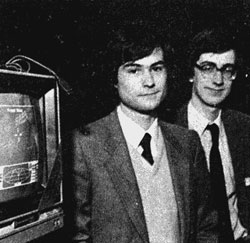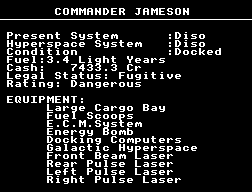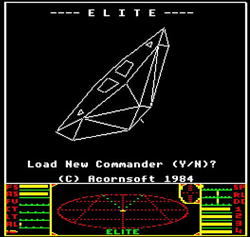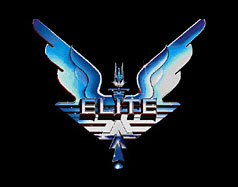In 1984, 8 bit computers all over the country started running seed numbers through fixed algorithms, creating sequences of other, bigger, numbers that might, for example, be used to determine the fictitious characteristics of a fictitious planets within a fictitious galaxy. These busy little algorithms could, with a bit of persuasion, be coaxed into generating a name for the planet, its relative position, the kinds of stuff its inhabitants might want to buy and sell, and the political climate in which they lived.
 It also meant that Cambridge undergraduates David Braben and Ian Bell, whose considerable egg-headedness had made this awesome (for 1984) bit of number crunching possible could swap their separate but similar pet projects – Freefall (Braben) and Fighter (Bell) – and combine to produce Elite, the first true incitement-to-divorce gaming experience, twenty years before relationship-deleting delights of franchises such as Chanpionship Manager, Total War, or Sim City.
It also meant that Cambridge undergraduates David Braben and Ian Bell, whose considerable egg-headedness had made this awesome (for 1984) bit of number crunching possible could swap their separate but similar pet projects – Freefall (Braben) and Fighter (Bell) – and combine to produce Elite, the first true incitement-to-divorce gaming experience, twenty years before relationship-deleting delights of franchises such as Chanpionship Manager, Total War, or Sim City.
A fact: one year after its release, Elite had sold 160,000 units on the platform for which it was designed, the venerable BBC B micro computer. This was more than the total number of BBC B micro computers.
The term ‘Elite’ pertains to the player’s ultimate aim in what is an open-ended game: the attainment of ‘Elite’ pilot status. The player starts as the equivalent of a door to door salesman in a Cobra Mk III, which is a lightly armed shoebox of a spacecraft, with a miniscule one hundred credits in loose change sliding around the dashboard. This situation is, as you might expect, rubbish, as is the player’s rating: a somewhat flaccid ‘Harmless’. However, by choosing a planet and cannily purchasing the type of goods that might be in demand there, the player can take his first wobbly steps on the road to trading glory. Foodstuffs are a good safe bet for early forays. These are in demand anywhere, are nice and uncontroversial, and therefore unlikely to attract the attention of either a) rogue squadrons of pirates b) solo brigands looking for easy pickings or c) the police. As incredibly lucrative as smuggling gems, drugs, weaponry or slaves to anarchy planets with no effective or discernable government can be, you’ll be atomised by the star cops or jumped by ne’er do wells as soon as you’ve adjusted your rear view mirror if you choose to do so on your early flights. The police lend Elite a brilliant added dynamic. With a reputable career path, they will spring to your aid in the event of attack and stand shoulder to shoulder with you against the hairy steller brigands. Pull one too many dodgy runs with contraband, or start attacking other ships, and they’ll be all over you from one end of the galaxy to the other.
 The trick, then, is to be just dodgy enough to reap pleasing fiscal rewards without attracting the wrong type of attention. The classic strategy is to trade foodstuffs and lower end desirables such as textiles, which are in demand almost everywhere (with greater or lesser margins depending upon the economy of the target planet – taking food somewhere with a strong agricultural base might not be so profitable), all the while quietly upgrading your ship until you are able to trade sexier products without getting blown up. There are many upgrades available. Without doubt, the first that any player would want to acquire is a docking computer. In Elite, access to any planet is via a docking station, and landing safely on it involves lining your ship up with, effectively, a letterbox on the side of a doedecahedron spinning in all three dimensions. If you get it even slighty wrong, you’re dead. It is quite a skill to master, and some players simply couldn’t do it, ending up hurling the game into a seldom-visited corner of the bedroom inhabited by Thompson Twins 12 inch singles, discarded Opal Fruit wrappers, and fake Ray Bans.
The trick, then, is to be just dodgy enough to reap pleasing fiscal rewards without attracting the wrong type of attention. The classic strategy is to trade foodstuffs and lower end desirables such as textiles, which are in demand almost everywhere (with greater or lesser margins depending upon the economy of the target planet – taking food somewhere with a strong agricultural base might not be so profitable), all the while quietly upgrading your ship until you are able to trade sexier products without getting blown up. There are many upgrades available. Without doubt, the first that any player would want to acquire is a docking computer. In Elite, access to any planet is via a docking station, and landing safely on it involves lining your ship up with, effectively, a letterbox on the side of a doedecahedron spinning in all three dimensions. If you get it even slighty wrong, you’re dead. It is quite a skill to master, and some players simply couldn’t do it, ending up hurling the game into a seldom-visited corner of the bedroom inhabited by Thompson Twins 12 inch singles, discarded Opal Fruit wrappers, and fake Ray Bans.
 Many upgrades would be seen as must-haves by one style of player, while totally disregarded by others. For example, many frugally minded traders opted for fuel scoops, allowing the player to ‘skim’ raw fuel from the surface of stars free of charge, if not free of risk. This might be combined with an enlarged cargo bay, allowing for the transportation of huge quantities of goods, along with heavy armour plating and a goodly stash of homing missiles to fire at marauding baddies until the cops arrive. This type of trader may well also invest in mining lasers, to blast raw minerals out of asteroids for sale when a suitable market was happened across. On the other hand, investment in a dedicated bad boy vehicle would see a fast ship with heavy lasers facing in all directions, equipped with hyperspace drive for quick getaways, and a cargo retrieval facility for picking up free floating goods from recently destroyed – by you, if you’re getting in to the spirit of things – traders.
Many upgrades would be seen as must-haves by one style of player, while totally disregarded by others. For example, many frugally minded traders opted for fuel scoops, allowing the player to ‘skim’ raw fuel from the surface of stars free of charge, if not free of risk. This might be combined with an enlarged cargo bay, allowing for the transportation of huge quantities of goods, along with heavy armour plating and a goodly stash of homing missiles to fire at marauding baddies until the cops arrive. This type of trader may well also invest in mining lasers, to blast raw minerals out of asteroids for sale when a suitable market was happened across. On the other hand, investment in a dedicated bad boy vehicle would see a fast ship with heavy lasers facing in all directions, equipped with hyperspace drive for quick getaways, and a cargo retrieval facility for picking up free floating goods from recently destroyed – by you, if you’re getting in to the spirit of things – traders.
Elite boasted many ship types, from nippy privateer skiffs to lumbering Anaconda trade hulks, all of which are attackable, and legendary Generation Ships, which are not, because they only exist in the manual, and not in the game itself. There are also ways to earn cash in addition to ferrying stuff around the universe. Missions become available as your reputation grew, with the most notorious being the Tribble mission, in which a player is offered a tempting reward to transport a cargo of small furry creatures from one planet to the other, without knowing that he is running the risk of an incurable Tribble infestation which will see vital parts of his ship being eaten by the pesky critters.
 Elite is a game of such subtle and seminal genius that an article of this length cannot hope to do justice to it. It was one of the first games to have a launch party – admittedly at Surrey’s rubbish Thorpe Park – and was lavishly packaged with a brilliant playing guide and a copy of Robert Holdstock’s novel The Dark Wheel. It was by no means necessary to read the book, and it’s doubtful that many did, but it was a commendable and sincere effort by Braben and Bell to immerse the player in the codes and morals of the Elite universe. The pair fell out over copyright issues in the afterglow of Elite‘s massive success, and although some notable sequels were released, they tended to be driven by improvements in graphics rather than new gameplay avenues. In truth, though, sequels weren’t really necessary. Such is the vastness of the original Elite‘s universe that there will still be undiscovered planets, twenty five years after the initial release, and a single game could plausibly have lasted for the whole quarter century, throwing up enough close shaves and thrilling escapes to keep the player fully engaged throughout. Elite is, was, and forever will be, magnificent.
Elite is a game of such subtle and seminal genius that an article of this length cannot hope to do justice to it. It was one of the first games to have a launch party – admittedly at Surrey’s rubbish Thorpe Park – and was lavishly packaged with a brilliant playing guide and a copy of Robert Holdstock’s novel The Dark Wheel. It was by no means necessary to read the book, and it’s doubtful that many did, but it was a commendable and sincere effort by Braben and Bell to immerse the player in the codes and morals of the Elite universe. The pair fell out over copyright issues in the afterglow of Elite‘s massive success, and although some notable sequels were released, they tended to be driven by improvements in graphics rather than new gameplay avenues. In truth, though, sequels weren’t really necessary. Such is the vastness of the original Elite‘s universe that there will still be undiscovered planets, twenty five years after the initial release, and a single game could plausibly have lasted for the whole quarter century, throwing up enough close shaves and thrilling escapes to keep the player fully engaged throughout. Elite is, was, and forever will be, magnificent.
Elite links:
RetroGT Elite t-shirt
Official Elite page at Frontier.co.uk
Elite at Wikipedia
David Brayben on Elite, and more

Comments are closed.